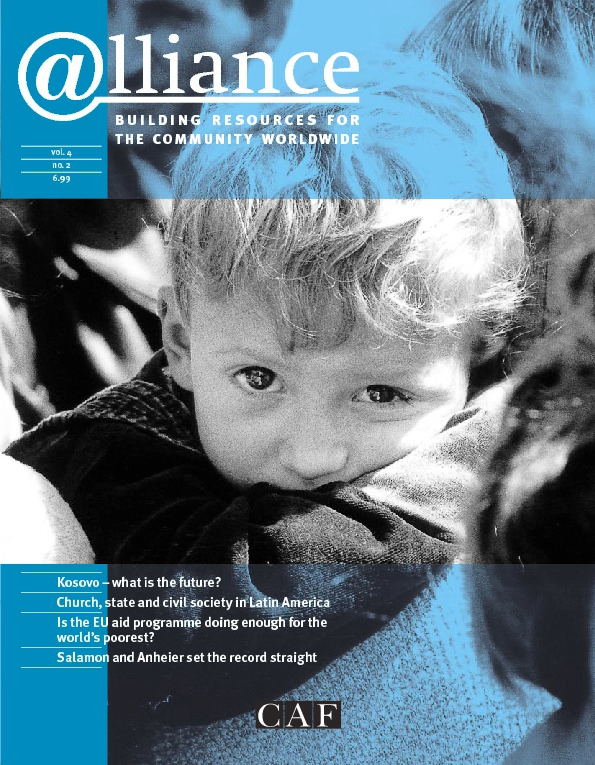Alan Fowler is at it again, ‘striking a balance’ between organizational development and being creatively embedded in the existing environment. Getting the balance right is critical to promoting enduring social change. The Virtuous Spiral focuses on an important question that confronts all non-governmental development organizations (NGDOs): how to achieve sustainable development and facilitate a ‘shift from dependence to independence’ in the midst of unpredictable global, national and local forces.
According to Fowler, ‘insightfulness’ is crucial here: ‘The heart of sustainability in development work lies in increasing the capacity of people and of NGDOs themselves to respond to forces they do not control in a particular and insightful way’. Fowler thus calls upon NGDOs to contribute to sustainable development by cultivating linkages between economy, ecology and the social system; to recognize, understand and adopt ways that work towards sustainable change; to promote ‘insightful agility’.
Parts II and III of the book look at what NGDOs can do to enable them to bring about enduring change. First, Fowler focuses on strategies for financial sustainability. Chapters 4 to 8 provide some excellent and detailed discussions of the options, strategies and trade-offs available to NGDOs to mobilize non-financial resources, commercialize their activities, gain funds from other sources such as government subsidies, private sector contributions, contracts and other domestic sources, and so maximize their independence from foreign aid. He stresses that maintaining a stable and sustainable resource base is one pillar of NGDOs working towards enduring and sustainable development impact.
The book also emphasizes the need for NGDOs to work towards ‘regeneration’ by cultivating characteristics that enable them to be agile in the midst of a turbulent environment. Fowler’s creativity and innovativeness come out best in Chapters 9 to 11 where he discusses the cycle of action, reflection, learning from past and current activities, and planning new actions that he calls ‘the virtuous spiral’ of performance. He concludes that the most important legacy a leader has to offer is ‘creating a virtuous spiral’ for the organization as an ‘interactive process bonding the NGDO with its environment’. He describes the virtuous spiral thus:
‘The starting point is performance in relation to the organization’s mission. Has it read the environment correctly and is it contributing something of enduring social value …? Recognition of this achievement creates a positive reputation, public support and feedback in terms of demand or other expression of appreciation. In its turn, coupled with its own performance assessment, public expression and critique feed into the learning process, creating new knowledge that incorporates past insight. And, if the organization is agile, renewed insight translates into organizational change and regeneration … the organization adapts to produce better impact and enhance social value …’
The book draws heavily on examples from Africa, Asia and Latin America ( the references and sources are impressive and informative). It is a milestone in bringing together research, knowledge and practices that have so far guided NGDOs and mapping out the future direction. Policymakers, leaders of civil society organizations, development practitioners, academics and donors will find The Virtuous Spiral a valuable reference source and a starting point for debates on sustainability. We hope NGDOs will take the many issues raised in the book with the seriousness they deserve.
There is a quality which radiates throughout this book. It indicates that work, research and debates are not finished. The book ends rather abruptly and unexpectedly, creating the impression that the writer intentionally does not want to bring the various threads/debates to a conclusion but rather to indicate that the struggle continues. We will not be surprised if Fowler continues with these debates, perhaps focusing more on the issue of leadership succession in NGDOs. It is our hope that this time he will not be alone in doing so.
The Virtuous Spiral: A guide to sustainability for NGOs in international development
Alan Fowler
Earthscan £14.95
To order
http://www.earthscan.co.uk
Dr Kabiru Kinyanjui is Senior Program Specialist at the International Development Research Centre, Nairobi. He can be contacted at kkinyanjui@idrc.or.ke
Dr Karuti Kanyinga is Senior Research Fellow at the Institute of Development Studies, University of Nairobi. He can be contacted at kkanyinga@swiftkenya.com





Comments (0)